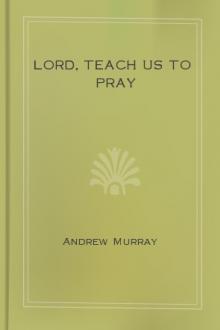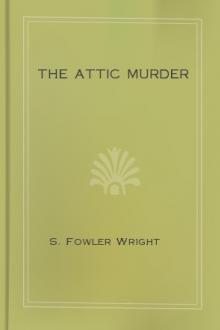Where No Fear Was, Arthur Christopher Benson [the little red hen read aloud txt] 📗

- Author: Arthur Christopher Benson
Book online «Where No Fear Was, Arthur Christopher Benson [the little red hen read aloud txt] 📗». Author Arthur Christopher Benson
XX
SERENITY
To achieve serenity we must have the power of keeping our hearts and minds fixed upon something which is beyond and above the passing incidents of life, which so disconcert and overshadow us, and which are after all but as clouds in the sky, or islets in a great ocean. Think with what smiling indifference a man would meet indignation and abuse and menace, if he were aware that an hour hence he would be triumphantly vindicated and applauded. How calmly would a man sleep in a condemned cell if he knew that a free pardon were on its way to him! Of course the more eagerly and enjoyably we live, so much the more we are affected by little incidents, beyond which we can hardly look when they bring us so much pleasure or so much discomfort; and thus it is always the men and women of keen and highly-strung natures, who taste the quality of every moment, in its sweetness and its bitterness, who will most feel the influence of fear. Edward FitzGerald once sadly confessed that, as life went on, days of perfect delight--a beautiful scene, a melodious music, the society of those whom he loved best--brought him less and less joy, because he felt that they were passing swiftly, and could not be recalled. And of course the imaginative nature which lives tremulously in delight will be most apt to portend sadness in hours of happiness, and in sorrow to anticipate the continuance of sorrow. That is an inevitable effect of temperament; but we must not give way helplessly to temperament, or allow ourselves to drift wherever the mind bears us. Just as the skilled sailor can tack up against the wind, and use ingenuity to compel a contrary breeze to bring him to the haven of his desire, so we must be wise in trimming our sails to the force of circumstance; while there is an eager delight in making adverse conditions help us to realise our hopes.
The timid soul that loves delight is apt to say to itself, "I am happy now in health and circumstances and friends, but I lean out into the future, and see that health must fail and friends must drift away; death must part me from those I love; and beyond all this, I see the cloudy gate through which I must myself pass, and I do not know what lies beyond it." That is true enough! It is like the story of the old prince, as told by Herodotus, who said in his sorrowful age that the Gods gave man only a taste of life, just enough to let him feel that life was sweet, and then took the cup from his lips. But if we look fairly at life, at our own life, at other lives, we see that pleasure and contentment, even if we hardly realised that it was contentment at the time, have largely predominated over pain and unhappiness; a man must be very rueful and melancholy before he will deliberately say that life has not been worth living, though I suppose that there have probably been hours in the lives of all of us when we have thought and said and even believed that we would rather not have lived at all than suffer so. Neither must we pass over the fact that every day there are men and women who, under the pressure of calamity and dismay, bring their lives to a voluntary end.
But we have to be very dull and thankless and slow of heart not to feel that by being allowed to live, for however short a time, we have been allowed to take part in a very beautiful and wonderful thing. The loveliness of earth, its colours, its lights, its scents, its savours, the pleasures of activity and health, the sharp joys of love and friendship, these are surely very great and marvellous experiences, and the Mind which planned them must be full of high purpose, eager intention, infinite goodwill. And we may go further than that, and see that even our sorrows and failures have often brought something great to our view, something which we feel we have learned and apprehended, something which we would not have missed, and which we cannot do without. If we will frankly recognise all this, we cannot feebly crumple up at the smallest touch of misery, and say suspiciously and vindictively that we wish we had never opened our eyes upon the world; and even if we do say that, even if we abandon ourselves to despair, we yet cannot hope to escape; we did not enter life by our own will, it is not our own prudence that has kept us there, and even if we end it voluntarily, as Carlyle said, by noose or henbane, we cannot for an instant be sure that we are ending it; every inference in the world, in fact, would tend to indicate that we do not end it. We cannot destroy matter, we can only disperse and rearrange it; we cannot generate a single force, we can only summon it from elsewhere, and concentrate it, as we concentrate electricity, at a single glowing point. Force seems as indestructible as matter, and there is no reason to think that life is destructible either. So that if we are to resign ourselves to any belief at all, it must be to the belief that "to be, or not to be" is not a thing which is in our power at all. We may extinguish life, as we put out a light; but we do not destroy it, we only rearrange it.
And we can thus at least practise and exercise ourselves in the belief that we cannot bring our experiences to an end, however petulantly and irritably we desire to do so, because it simply is not in our power to effect it. We talk about the power of the will, but no effort of will can obliterate the life that we have lived, or add a cubit to our stature; we cannot abrogate any law of nature, or destroy a single atom of matter. What it seems that we can do with the will is to make a certain choice, to select a certain line, to combine existing forces, to use them within very small limits. We can oblige ourselves to take a certain course, when every other inclination is reluctant to do it; and even so the power varies in different people. It is useless then to depend blindly upon the will, because we may suddenly come to the end of it, as we may come to the end of our physical forces. But what the will can do is to try certain experiments, and the one province where its function seems to be clear, is where it can discover that we have often a reserve of unsuspected strength, and more courage and power than we had supposed. We can certainly oppose it to bodily inclinations, whether they be seductions of sense or temptations of weariness. And in this one respect the will can give us, if not serenity, at least a greater serenity than we expect. We can use the will to endure, to wait, to suspend a hasty judgment; and impulse is the thing which menaces our serenity most of all. The will indeed seems to be like a little weight which we can throw into either scale. If we have no doubt how we ought to act, we can use the will to enforce our judgment, whether it is a question of acting or of abstaining; if we are in doubt how to act, we can use our will to enforce a wise delay.
The truth then about the will is that it is a force which we cannot measure, and that it is as unreasonable to say that it does not exist as to say that it is unlimited. It is foolish to describe it as free; it is no more free than a prisoner in a cell is free; but yet he has a certain power to move about within his cell, and to choose among possible employments.
Anyone who will deliberately test his will, will find that it is stronger than he suspects; what often weakens our use of it is that we are so apt to look beyond the immediate difficulty into a long perspective of imagined obstacles, and to say within ourselves, "Yes, I may perhaps achieve this immediate step, but I cannot take step after step--my courage will fail!" Yet if one does make the immediate effort, it is common to find the whole range of obstacles modified by the single act; and thus the first step towards the attainment of serenity of life is to practise cutting off the vista of possible contingencies from our view, and to create a habit of dealing with a case as it occurs.
I am often tempted myself to send my anxious mind far ahead in vague dismay; at the beginning of a week crammed with various engagements, numerous tasks, constant labour, little businesses, many of them with their own attendant anxiety, it is easy to say that there is no time to do anything that one wants to do, and to feel that the matters themselves will be handled amiss and bungled. But if one can only keep the mind off, or distract it by work, or beguile it by a book, a walk, a talk, how easily the thread spins off the reel, how quietly one comes to harbour on the Saturday evening, with everything done and finished!
Again, I am personally much disposed to dread the opposition and the displeasure of colleagues, and to shrink nervously from anything which involves dealing with a number of people. I ought to have found out before now how futile such dread is; other people forget their vexation and even grow ashamed of it, much as one does oneself; and looking back I can recall no crisis which turned out either as intricate or as difficult as one expected.
Let me admit that I have more than once in life made grave mistakes through this timidity and indolence, or through an imaginativeness which could see in a great opportunity nothing but a sea of troubles, which would, I do not doubt, have melted away as one advanced. But no one has suffered except myself! Institutions do not depend upon individuals; and I regard such failures now just as the petulant casting away of a chance of experience, as a lesson which I would not learn; but there is nothing irreparable about it; one only comes, more slowly and painfully, to the same goal at last. I dare not say that I regret it all, for we are all of us, whether small or great, being taught a mighty truth, whether we wish it or know it; and all that we can do to hasten it is to put our will into the right scale. I do not think mistakes and failures ought to trouble one much; at all events there is no fear mingled with them. But I do not here claim to have attained any real serenity--my own heart is too impatient, too fond





Comments (0)